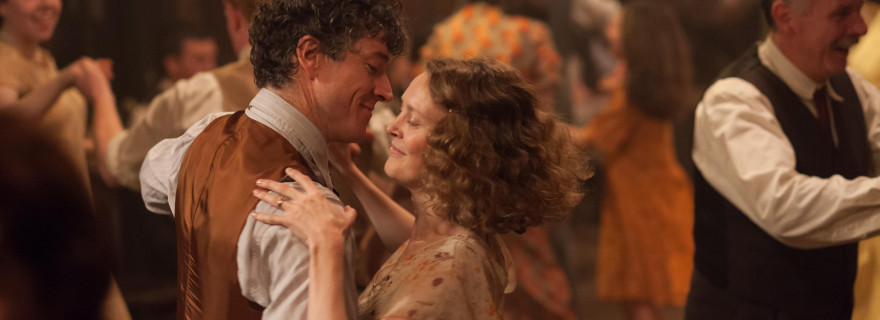'Jimmy's Hall'
Movie Rating:
3
Ken Loach has been a quietly important filmmaker for decades now. From his groundbreaking early realist dramas like ‘Kes‘ to late career triumphs like ‘The Wind that Shakes the Barley’, he’s been a pillar of the British filmmaking community. Having just celebrated his 79th birthday, Loach has suggested that ‘Jimmy’s Hall’ will likely be his final movie. While by no means his best effort, the quiet dignity of the production should be a fine note to go out on.
Based on an obscure and bizarre slice of Irish history, the film centers on James Gralton (Barry Ward), a man who was deported from Ireland without trial for taking a stance against the Catholic Church. (How dare he?!) The story unfolds in 1932 as Gralton returns to his small rural community in Ireland after a few years abroad in New York. Before leaving for the jazz and smokestacks of overseas, Gralton once ran a community center that has sat derelict ever since. Shortly after arriving, the local teens get together and beg Gralton to open it again.
You see, with Ireland struck by endless unemployment and virtually all aspects of their lives supervised by the Church, the kids don’t even have a place to dance anymore. So, Gralton opens up his hall again, offering dances, lessons, music and socializing. You know, just the sort of thing that the Catholic Church would despise. Indeed, the local parish priest, Father Sheridan (Jim Norton), immediately calls out all those who dare to enter the hall and demands that the place not continue without his direct involvement. Gralton doesn’t take kindly to that suggestion, and a battle kicks off. As you might have guessed by the first sentence of this summary, it’s not one he’s destined to win.
Right now you’re probably thinking, “Wait a minute… is that the plot of Footloose?” Well, in a way, you’re right. This movie is very much Ken Loach’s ‘Footloose’ in ways both good and bad. On the plus side, the filmmaker’s eye for period detail and naturalistic performances is very much in effect. Loach was never one for constructed sets or theatricality, and ‘Jimmy’s Hall’ very much retains the style of worn-in realism that we’ve come to expect from the filmmaker. The world is vividly designed, as if you could walk into the screen and join in. At their best, the entire cast all feel like they wandered in and are merely having conversations rather than acting in scenes. There are passages when Loach’s love of improvisation and collaborating with his actors clearly shines through, leading to a wonderful ensemble performance and scenes that unfold with the jagged rhythms of life.
Of course, this is ultimately a serious version of ‘Footloose’, so the flick isn’t without its share of melodrama. Though Norton does quite well in the domineering priest role, he’s stuck with some cartoonishly didactic rants about the evils of heathen music and culture that can feel a little overblown. Loach gets away with it thanks to his more grounded scenes and the eruptions of anger and violence that give the material some genuine sting.
Overall, the film still works. It’s just a far cry from the heartbreaking naturalism or pointed politics of Loach’s best work. Still, by his standards, it’s as close to populism as the filmmaker gets and certainly a heartwarming and moving experience. For a swan song from a 79-year-old director, that’ll do just fine.



